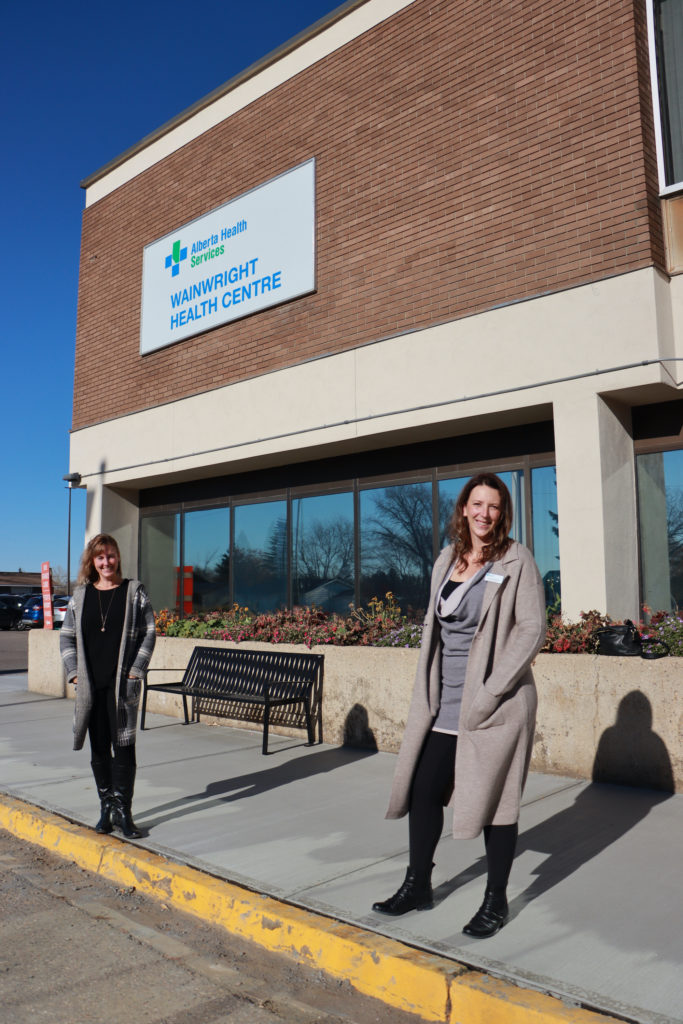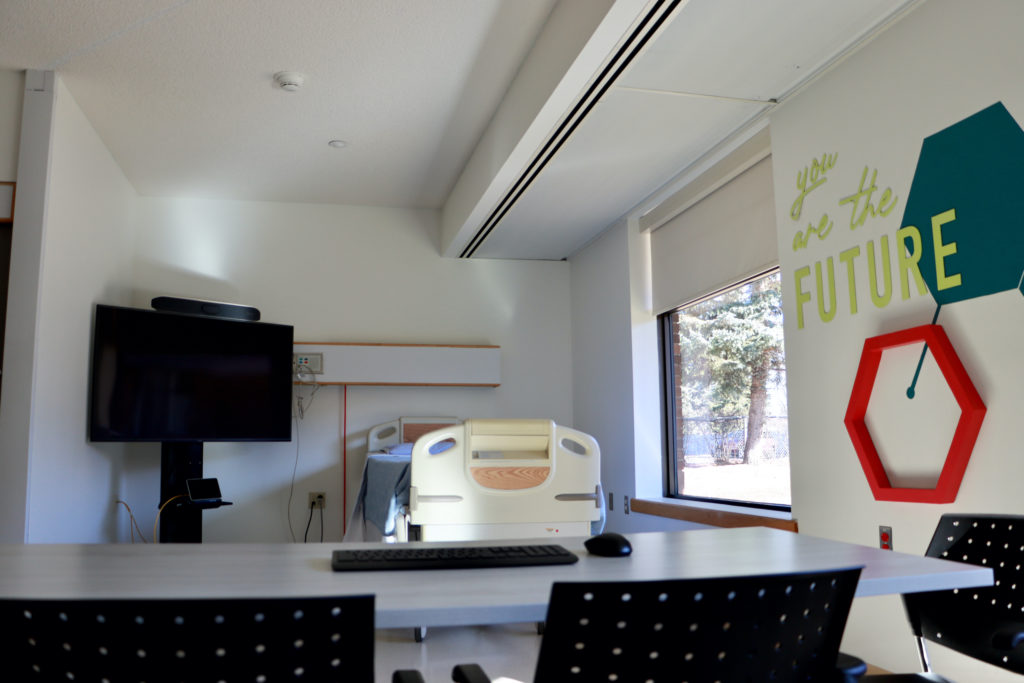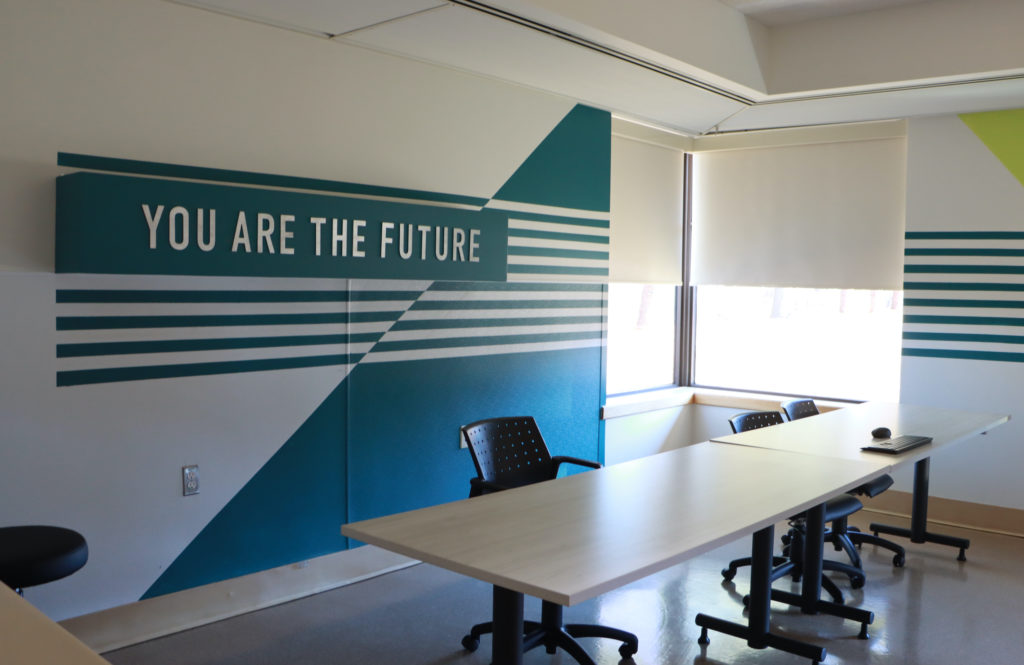
– Photo by Billi J. Miller
The recruitment and retention of nurses has been a challenge in rural Alberta for years. In response to that challenge, a “grow your own” strategy has been developed to help meet the registered nurse (RN) workforce needs in the Wainwright area.
Part of this strategy is the development of a Bachelor of Nursing Program–Rural Community. Developed by the University of Calgary (UCalgary) Faculty of Nursing, this program is centred on providing education directly in rural communities to better prepare students for the realities of rural nursing.
The town of Wainwright, located 210 km southeast of Edmonton, is the first home of this rural undergraduate nursing program.
The first group of eight students in this program are Alberta residents who live no farther than 120 km from Wainwright and range in age from their late teens to their 40s. The group began studying in September and is expected to graduate in 2025.
“This innovative program gives students the opportunity to become RN’s while remaining in their rural community.”
– Amy Deagle, Director of Health Professions for RhPAP
The seed for this program was planted by Jamie Malone, Area Manager for the M.D. of Wainwright, Alberta Health Services (AHS), and Carley Herbert, the Economic Development Officer for the Town and M.D. of Wainwright, in response to challenges faced by the community in attracting and retaining skilled nurses.
“Wainwright isn’t unique in that it faces staffing shortages that are being seen province-wide in Alberta,” Malone explained of the community of about 6,500 residents that serves a broader area of over 20,000 people.
The RN program operates out of the Wainwright Health Centre, which consists of 25 acute care beds (including two designated maternity beds), 69 long-term care beds, and a six-bed emergency department.
Leadership from the Wainwright Health Centre and AHS reached out to UCalgary’s Faculty of Nursing for assistance and partnership to develop the concept.
This contact led to a collaboration with the Alberta Government, UCalgary, AHS, and the Town of Wainwright to make this program a reality.


The Wainwright “classrooms,” are smaller versions of the classroom spaces in Calgary and are furnished with equipment and supplies similar to what urban students use at the university. The new classrooms are located in what were once functioning patient-care rooms. This set up ensures a realistic learning environment.
Two adjoining rooms have been retrofitted to include classroom and lab space with full virtual-learning technological capabilities and were developed after extensive consultation with AHS, the Wainwright Health Centre, and the UCalgary’s Clinical Simulation Learning Centre (CSLC).
Students are currently taking online nursing prerequisite courses such as statistics and anatomy and physiology and will begin using the classrooms in Wainwright in their second year, with instructors anticipated to be hired from the local area.
Malone said the Wainwright nursing program was developed around the university’s curriculum and will cover the same content and offer the same quality of education.
The Wainwright program may also feature some rural-specific nursing scenarios, while possibly touching on the unique needs of the region’s demographics including three Hutterian Brethren communities and a Canadian Forces Military Base.
Malone said that recruiting RNs who are not from or committed to a specific rural community often tends to be unsuccessful in the long term. Instead, if students are educated and trained within their own communities, they are more likely to stay, she explained.
“There are so many opportunities in Wainwright and district, so being able to partner, bring awareness, and attract people to the health-care field has been wonderful.”
– Carley Herbert, Economic Development Officer for the Town and M.D. of Wainwright
As the area’s economic development officer, Herbert thinks the program has many positives for the region.
High school students will see first-hand the many local employment opportunities in health care as these students graduate and settle into local nursing positions. As such, it may also increase the chance that other local students will put down roots and pursue a successful career in their home communities, she said.
According to Herbert, the addition of the RN program along with the Health-Care Aide Program and RhPAP Let’s Go Rural! events help show high school students the many career options that are available in rural health care and may increase the chance that these students will stay local.
“There are so many opportunities in Wainwright and district, so being able to partner, bring awareness, and attract people to the health-care field has been wonderful,” Herbert said.
“This [program] will help keep our community thriving and growing into the future,” Malone concluded.
“This innovative program gives students the opportunity to become RN’s while remaining in their rural community,” added Amy Deagle, Director of Health Professions for RhPAP.
“[It] opens doors for so many who may have had limitations due to family or other commitments when training was only available in the city.
“I am so excited to see this door opened for rural students and their communities.”
